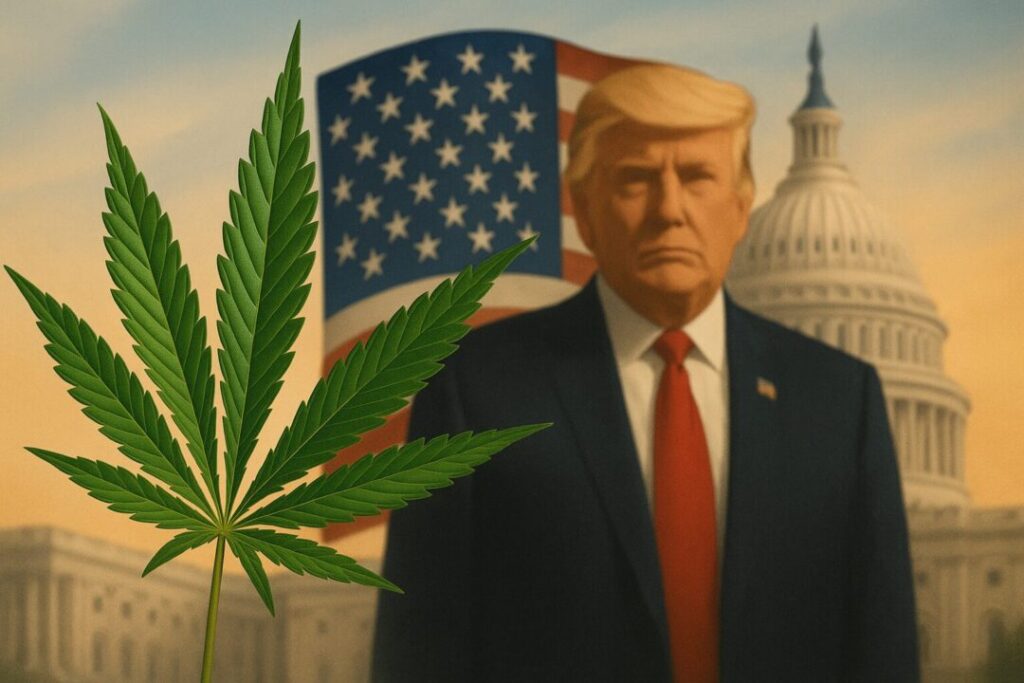President Donald Trump may be about to make one of his most surprising policy moves yet.
According to an August 9 report in The Wall Street Journal, Trump is considering lowering marijuana’s federal classification from Schedule I to Schedule III under the Controlled Substances Act.
That would move it from the same legal category as heroin to one that’s closer to prescription drugs like Tylenol with codeine.
The idea was first floated under the Biden administration but never finalized.
Now, Trump’s team is looking at it again, possibly influenced by a recent $1 million-a-plate fundraiser attended by some of the biggest names in the cannabis industry, including Trulieve CEO Kim Rivers.
Why It Matters for Nevada
Nevada voters legalized recreational marijuana in 2016, and the industry here has exploded.
State reports show cannabis tax revenue hit nearly $900 million since legalization – money going into schools and public services.
But that doesn’t mean Nevadans are united on the issue.
Social conservatives worry about rising public use, impaired driving, and what they see as a decline in community standards.
Some Las Vegas parents complain about the smell of weed near schools and parks.
The Conservative Divide
Conservatives aren’t all on the same page about marijuana; not by a long shot.
Traditionalists and Social Conservatives
For many in this camp, marijuana use is still a moral and public safety problem.
Commentators point to cities that have legalized and claim they’ve seen more crime, more homelessness, and less respect for public spaces.
There’s also the health risk argument.
Johns Hopkins researchers have linked high-potency marijuana to an increased risk of psychosis in some users.
The American Society of Addiction Medicine warns about dependence, lung issues, and negative effects on developing brains.
For these conservatives, Trump’s move could look like caving to big-money lobbyists instead of defending public health and social order.
Libertarians and Younger Conservatives
On the other hand, many younger Republicans and libertarians see reclassification as common sense.
A 2024 Gallup poll found 70% of Americans support legalization, including more than half of Republicans under 30.
They argue marijuana is far less harmful than alcohol, and that keeping it in Schedule I (alongside drugs with no recognized medical use) makes no scientific sense.
The 2017 National Academies of Sciences report backs them up on certain medical benefits, including relief for chronic pain and seizure disorders like Dravet syndrome.
For this group, the government shouldn’t be in the business of telling adults what they can or can’t put in their own bodies, especially when 24 states and Washington, D.C. have already legalized recreational use.
Is It About Freedom… or Politics?
Some see Trump’s possible pivot as a way to win over younger voters and swing states where legalization is popular.
Others think it’s a strategic nod to states’ rights, letting each state set its own marijuana laws without federal interference.
Of course, there’s skepticism too.
Critics note the timing of the fundraiser with cannabis executives and question whether this is more about pleasing donors than making principled policy.
What Happens Next
If Trump moves forward, the change wouldn’t make marijuana legal nationwide.
It would simply reduce federal restrictions, making it easier for researchers to study and for marijuana businesses to operate without as much banking trouble.
That’s where the real conservative tension lies:
-
Pro-reclassification conservatives see it as cutting government red tape.
-
Anti-reclassification conservatives see it as opening the door to more social problems.
For Nevada, the decision could mean a booming industry gets even bigger – or that more people end up using marijuana in public spaces, something many residents already dislike.
Either way, the debate shows just how much the conservative movement is wrestling with balancing personal freedom, public health, and traditional values.
Trump’s final decision could come in 2026, depending on how quickly the DEA moves. Between now and then, expect the conversation to heat up.
The opinions expressed by contributors are their own and do not necessarily represent the views of Nevada News & Views. This article was written with the assistance of AI. Please verify information and consult additional sources as needed.



